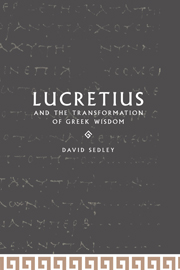Book contents
- Frontmatter
- Contents
- Preface
- Introduction
- Chapter 1 The Empedoclean opening
- Chapter 2 Two languages, two worlds
- Chapter 3 Lucretius the fundamentalist
- Chapter 4 Epicurus, On nature
- Chapter 5 Lucretius' plan and its execution
- Chapter 6 The imprint of Theophrastus
- Chapter 7 The transformation of book I
- Epilogue
- Bibliography
- Index locorum
- General index
- Index of modern scholars
Introduction
Published online by Cambridge University Press: 22 September 2009
- Frontmatter
- Contents
- Preface
- Introduction
- Chapter 1 The Empedoclean opening
- Chapter 2 Two languages, two worlds
- Chapter 3 Lucretius the fundamentalist
- Chapter 4 Epicurus, On nature
- Chapter 5 Lucretius' plan and its execution
- Chapter 6 The imprint of Theophrastus
- Chapter 7 The transformation of book I
- Epilogue
- Bibliography
- Index locorum
- General index
- Index of modern scholars
Summary
The old quarrel between poetry and philosophy may have simmered down, but in Lucretian studies the two do not always manage to be as willing allies as they ought to be. Lucretius used poetry to illuminate philosophy. My aim in this book is to use philosophy to illuminate poetry.
Lucretius' achievements as a poet to a large extent lie in his genius for transforming Epicurean philosophy to t a language, a culture and a literary medium for which it was never intended. In order to understand how he has brought about this transformation, we need to know all we can about what he was transforming and how he set about his task.
In Chapter 1, ‘The Empedoclean opening’, I try to show how he denes the pedigree of his literary medium. It is the poetic genre of the hexameter poem on physics, pioneered by Empedocles. Lucretius' way of proclaiming this, I argue, is to write a proem which emphasises the nature and extent of his debt to Empedocles.
In Chapter 2, ‘Two languages, two worlds’, I turn to a neglected linguistic aspect of Lucretius' enterprise, his ambiguous relationship with the Greek language. The transition from Epicurus' technical Greek prose to Lucretius' largely untechnical Latin verse is not merely a formidable task of conversion, it is also an opportunity for Lucretius to map out an interrelation between two cultures.
- Type
- Chapter
- Information
- Lucretius and the Transformation of Greek Wisdom , pp. xv - xviiiPublisher: Cambridge University PressPrint publication year: 1998



